Welcome! Ready to explore Suwon? This dynamic city, just a stone’s throw from Seoul, South Korea. It offers a unique blend of history, culture, and modernity. From its UNESCO-listed Hwaseong Fortress to its vibrant street food scene, Suwon invites travelers to walk through centuries of history while enjoying the comforts and excitement of a modern urban center.
Suwon holds a special place in my heart. When I first started dating That Backpacker (now my wife) we would often meet at Suwon station as the halfway point. We enjoyed spending time exploring the city and also using the city as a launching pad for taking day trips to visit places such as the Korean Folk Village

Discover Suwon’s Historical Heart
A Stroll Through the Past: At the heart of Suwon’s appeal is the impressive Hwaseong Fortress, a stunning example of late 18th-century Korean fortification. This massive structure encircles the central part of the city, and you can walk along its walls for panoramic views of urban and semi-urban landscapes merging seamlessly. Whether you’re watching an archery display or exploring the secret gates and towers, the fortress is a journey back in time.
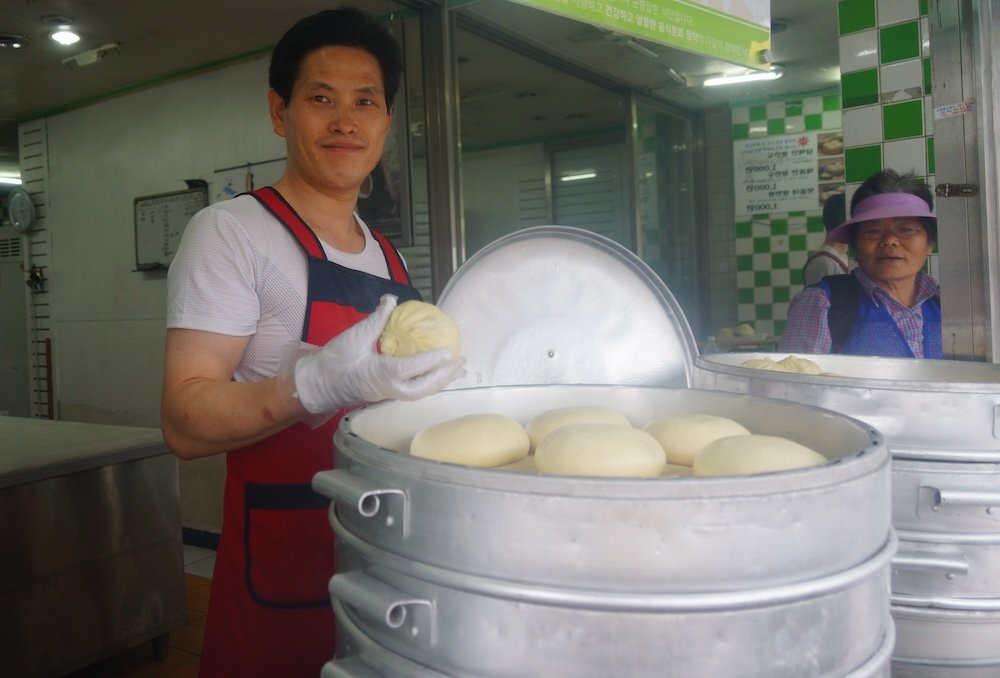
Culinary Delights
Taste the Local Flavors: No visit to Suwon is complete without trying the famous Suwon galbi, sweet and savory marinated beef ribs that are a source of local pride. Dive into bustling markets like the Suwon Nammun Market, where the aromas of fresh, spicy, and savory street food are irresistible. From hotteok filled with seeds and brown sugar to spicy tteokbokki, your taste buds are in for a treat.
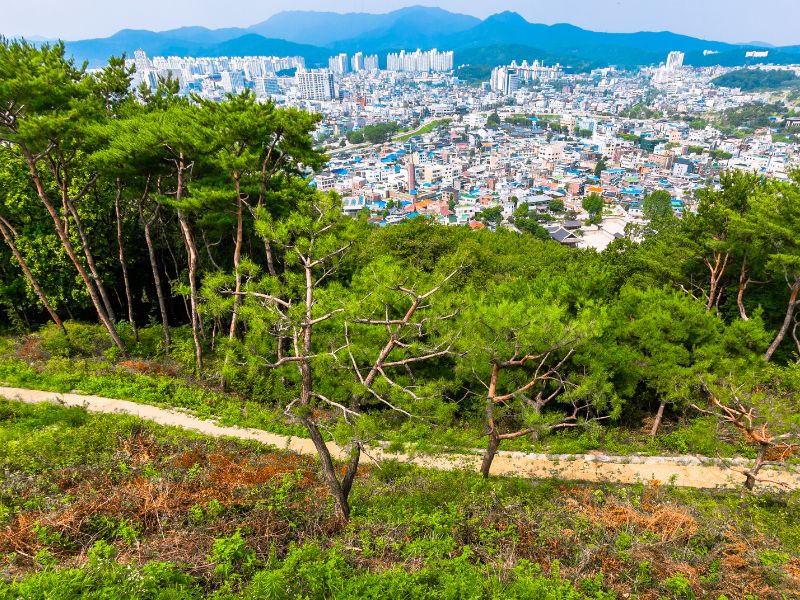
Modern Charms and Green Spaces
Beyond the Fortress Walls: While its historical structures might draw you in, Suwon’s charm doesn’t stop at its ancient gates. The city boasts lush green parks, such as the Gwanggyo Lake Park, an ideal spot for a leisurely day out with its art center and water features. The city’s arts and festival scene is also vibrant, with events like the Suwon Hwaseong Cultural Festival bringing the streets to life each fall.

Impressions
A City of Layers: Suwon is a place where old meets new. With its easy accessibility from Seoul via subway, it’s a convenient day trip or a worthy stop on a longer South Korean adventure. Pack your most comfortable shoes, charge your camera, and prepare yourself for an unforgettable exploration of one of South Korea’s most fascinating cities!
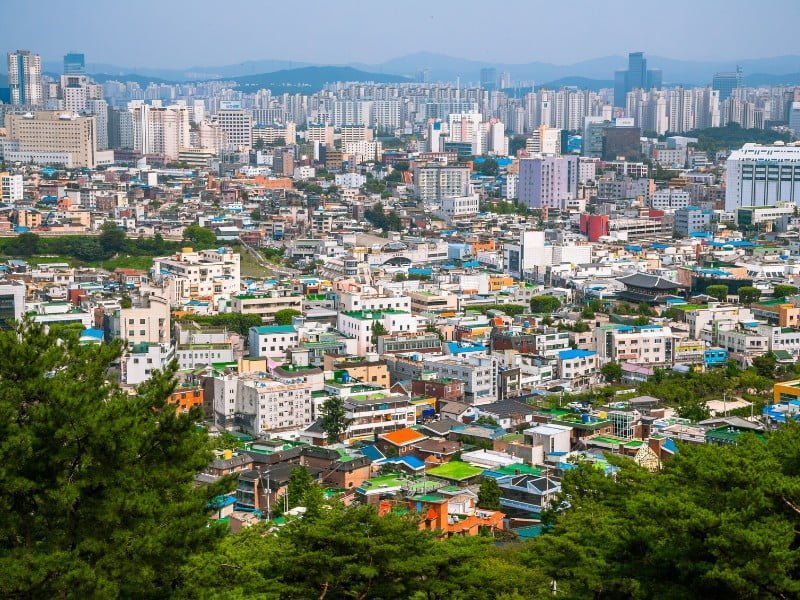
Suwon City Guide: A Brief History Of Suwon, South Korea
Suwon is a city that intertwines ancient traditions with modern advances. Let’s dive into the past and uncover the layers that make Suwon a captivating destination for history enthusiasts and casual explorers alike.
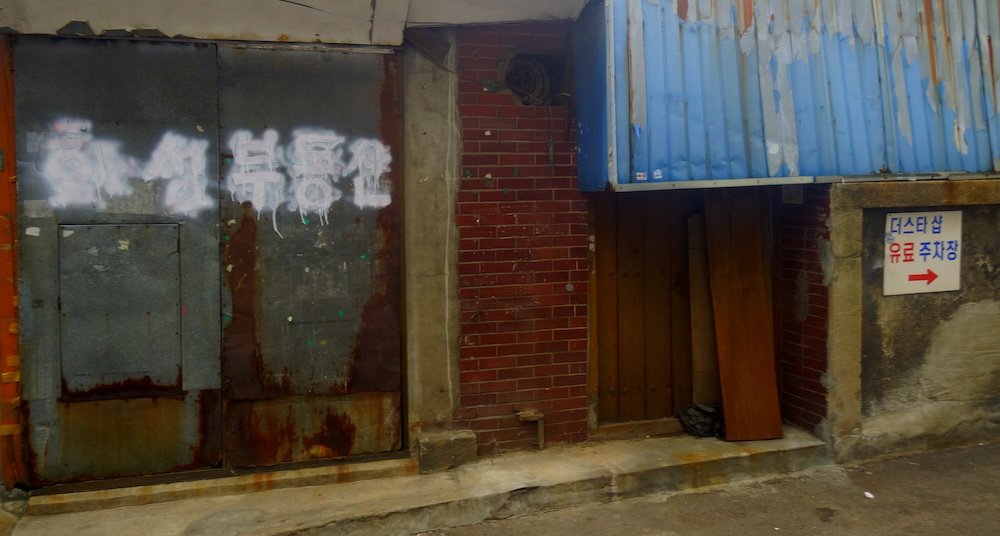
The Origins and Ancient Times
From Humble Beginnings: The area now known as Suwon has been inhabited since prehistoric times, with numerous archaeological finds dating back to the Bronze Age indicating a long history of settlement. However, it wasn’t until the Joseon Dynasty that Suwon began to emerge as a city of significance. Its strategic location on major roads made it a focal point for military and economic activities.
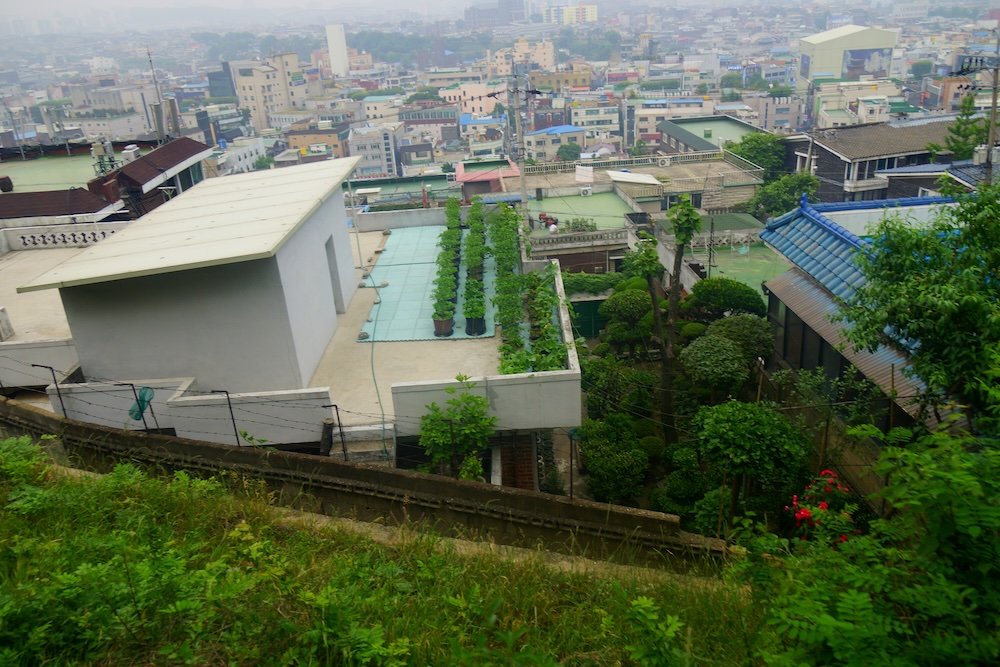
The Joseon Dynasty and King Jeongjo’s Vision
A King’s Ambition: The turning point in Suwon’s history came in the 18th century under the reign of King Jeongjo. In 1796, he ordered the construction of the Hwaseong Fortress, an ambitious project intended to serve as a new political hub and as a defensive structure. The fortress was also a tribute to his father, Crown Prince Sado, who had been tragically executed.
A Fortified City: Constructed from 1794 to 1796, Hwaseong Fortress is renowned for its unique blend of Eastern and Western architectural styles and innovative defensive features. This massive structure not only fortified the city but also helped catalyze its economic development. The walls of this fortress run for kilometers, surrounding the heart of the old city and standing as a testament to the city’s historical importance.
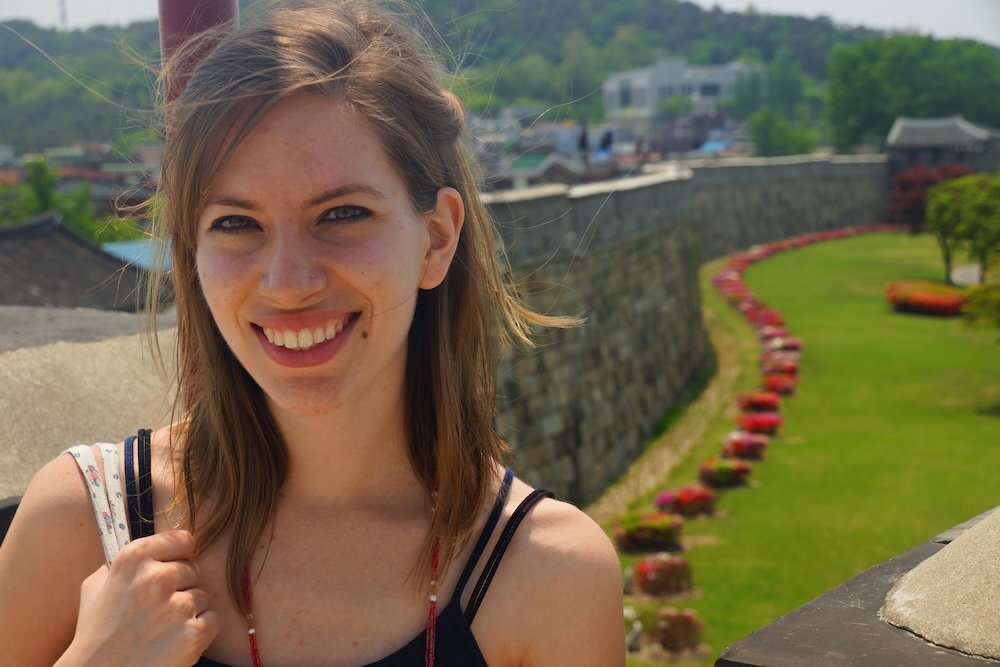
Modern Developments and Industrialization
Entering the Modern Era: The 20th century was a period of rapid transformation for Suwon, as it was for much of Korea. After the Korean War, the city experienced significant industrial growth, particularly with the establishment of a Samsung Electronics factory in the 1960s. This marked the beginning of Suwon’s evolution into a major economic center.
Technological Hub: Today, Suwon is often referred to as the leading city of the Korean Wave, Hallyu, due to its vibrant culture and technological advancements. It has become a focal point for innovation in electronics and information technology, hosting several high-tech industrial complexes.
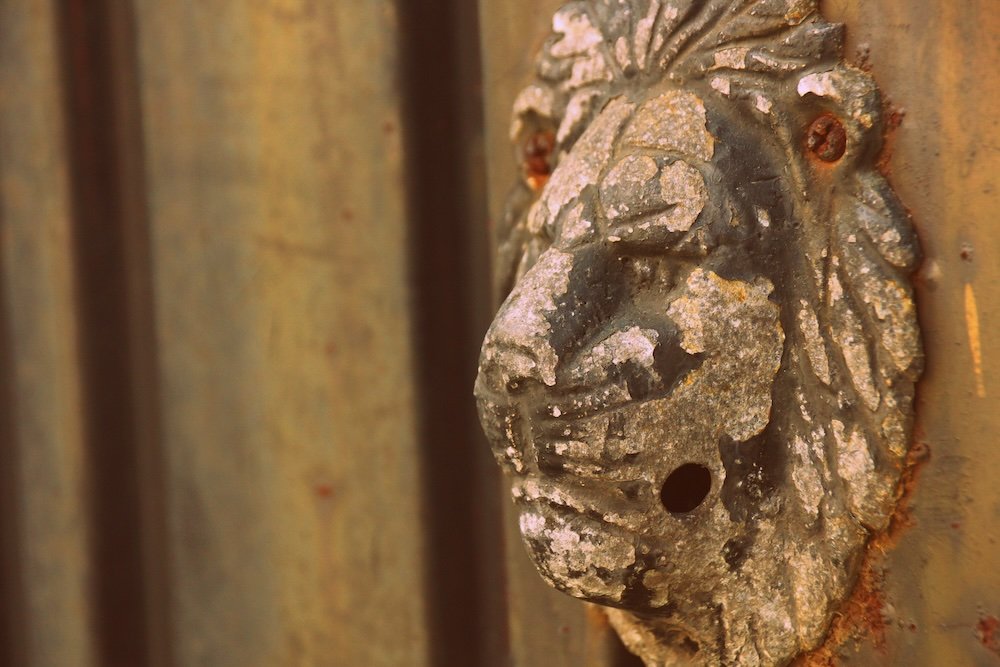
Cultural Renaissance
Preserving the Past, Embracing the Future: Despite its rapid modernization, Suwon has not lost sight of its historical roots. The city carefully preserves its cultural heritage while integrating it with modern attractions and amenities. Annual festivals celebrating both the history of the Hwaseong Fortress and contemporary culture attract visitors from all over the globe.
source: Nomadic Samuel on YouTube
A Living History: Suwon is a city where the past and present coexist beautifully. Whether you’re walking along the ancient fortress walls or exploring a state-of-the-art shopping center, Suwon offers a unique blend of history and modernity. It’s a place where every corner tells a story, inviting travelers to create their own memories.
source: Cari Cakes on YouTube
Suwon Top Attractions and Best Places to Visit in South Korea
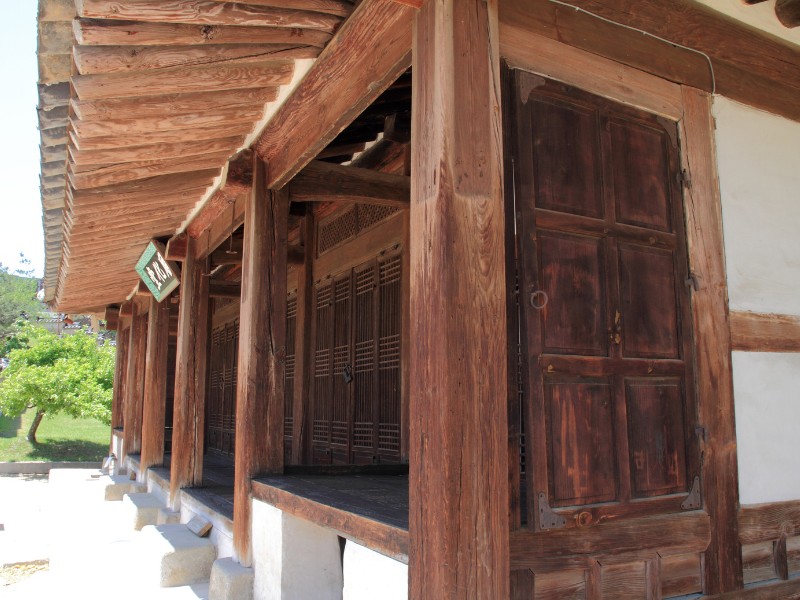
Situated within easy reach of Seoul, Suwon is an excellent day trip destination for those spending time in South Korea’s largest city.
With a UNESCO World Heritage Site along with a futuristic museum run by Samsung, this destination will take up an entire day, so make your plans appropriately.
Those making the trip down to Suwon typically have the Hwaseong Fortress at the top of their sightseeing list. This castle was constructed near the end of the 18th century by King Jeongjo in honour of his late father, Prince Sado. This royal met an untimely end at the hands of his father, King Yeongjo, who murdered him by locking him alive inside a rice chest.
This fortification is a worthy tribute, as its outer walls sprawl over five kilometres around the main complex. The structure’s goal, other than building a permanent monument to Jeongjo’s late father, was to become the centre of what would eventually become Korea’s new capital. In the end, Seoul retained this title, but the ambition of this castle has allowed it to earn its claim as a UNESCO World Heritage Site easily.
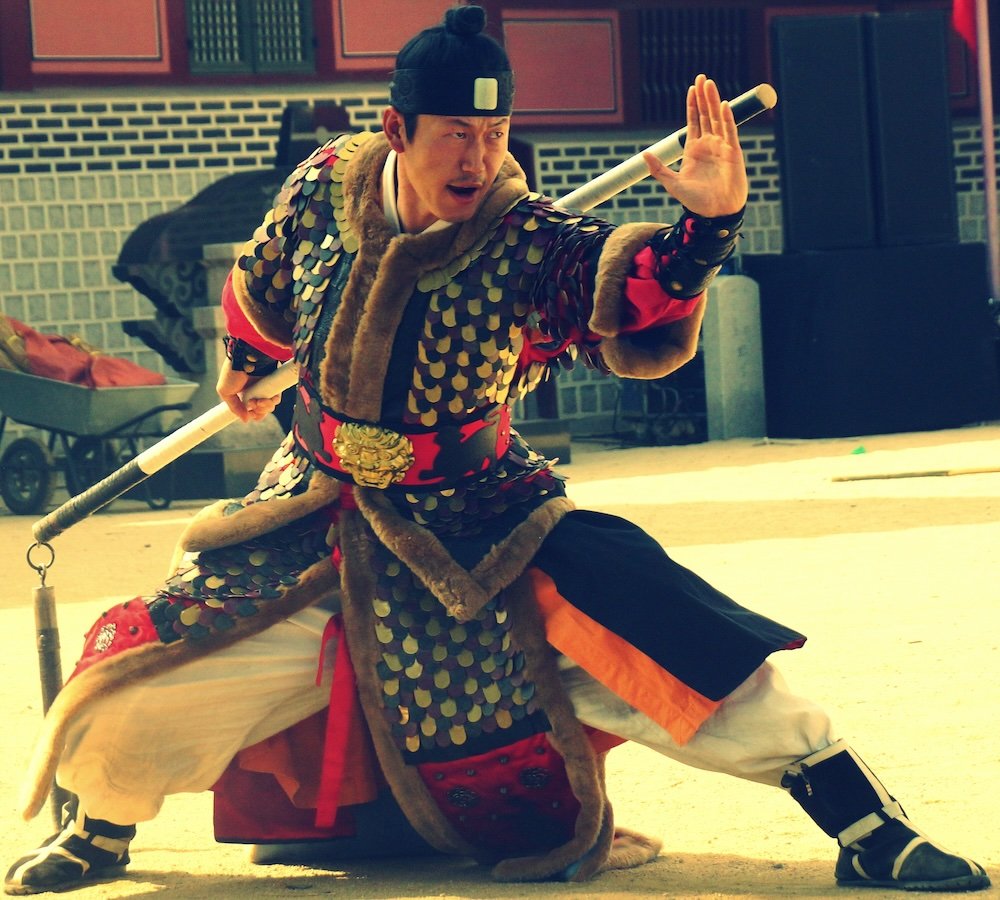
More Attractions
When you aren’t exploring its inner sanctum, walk its walls for the low sum of 1,000 Korean Won. All along its perimeter, excellent opportunities exist for photos, as this landmark affords fantastic views of the city of Suwon and the mountains that surround it.
Before leaving the Hwaseong Fortress area, be sure to check out the Hwahongmun Gate. This specific part of the castle’s structure was designed to allow the Suwon River to pass through while maintaining the defences of this 18th-century Korean castle.
With picturesque arches and concrete steps that create a visually-pleasing waterfall effect, this spot is a favourite among locals and photographers. With a tea house situated nearby, this is the perfect place to end your tour of Hwaseong Fortress.
Still haven’t had enough of Korea’s imperial past? Move on to the Hwaseong Haenggung Palace, where this nation’s royals resided during times of war. Built in the late 18th century, this well-maintained structure resembles many of the Buddhist temples that exist across in the country in its style.
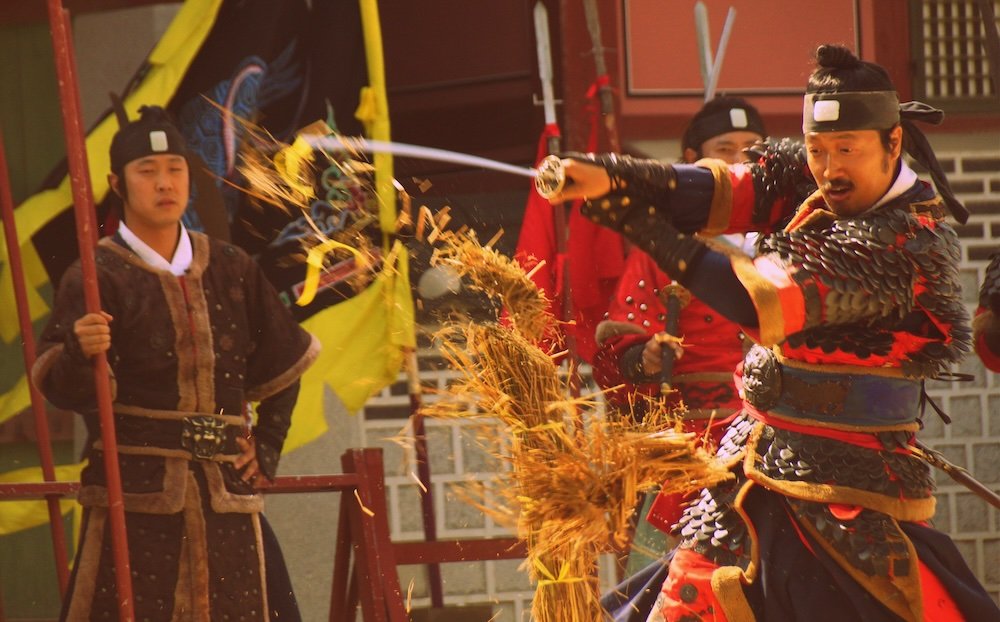
Other Attractions
It is best-known in the present day for its regular displays of Korean martial arts. Done in traditional costume, these performers use real weapons such as spears and swords to hack straw dummies to pieces – don’t forget to videotape it to show friends and family.
Throughout South Korea’s rise to prominence, Samsung has been a central figure. Learn more about this corporation’s greatest creations at the Samsung Innovation Museum. This institution isn’t all about this company’s achievements – it addresses the very concept of innovation itself, starting from the harnessing of electricity.
As you make your way through the complex, you’ll get to see artifacts of devices that represent progress – from telegraph machines to TVs to smartphones, you’ll barely notice the Samsung product placements until close to the end.
The final stretch of exhibits shows off some of Samsung’s visions for the future – from cars that can charge wirelessly to being able to replay memories, the ambitions this company explains the enormous success it has enjoyed in the present day.

Other Cultural Attractions: Trip to Suwon, Korea
Want to lighten the mood a bit? Make time in your schedule to check out Mr. Toilet House. Once home to the sanitation manager (and later, mayor) of Suwon, he spent his entire life improving the condition and access to toilets around the world.
After his death, the city of Suwon acquired his house and turned it into a museum dedicated to all things related to toilets. They even changed the exterior to resemble the porcelain throne we sit upon every day. Throughout its halls, you’ll get to check out different johns, art related to toilets, and displays that highlight the importance of sanitation throughout history.
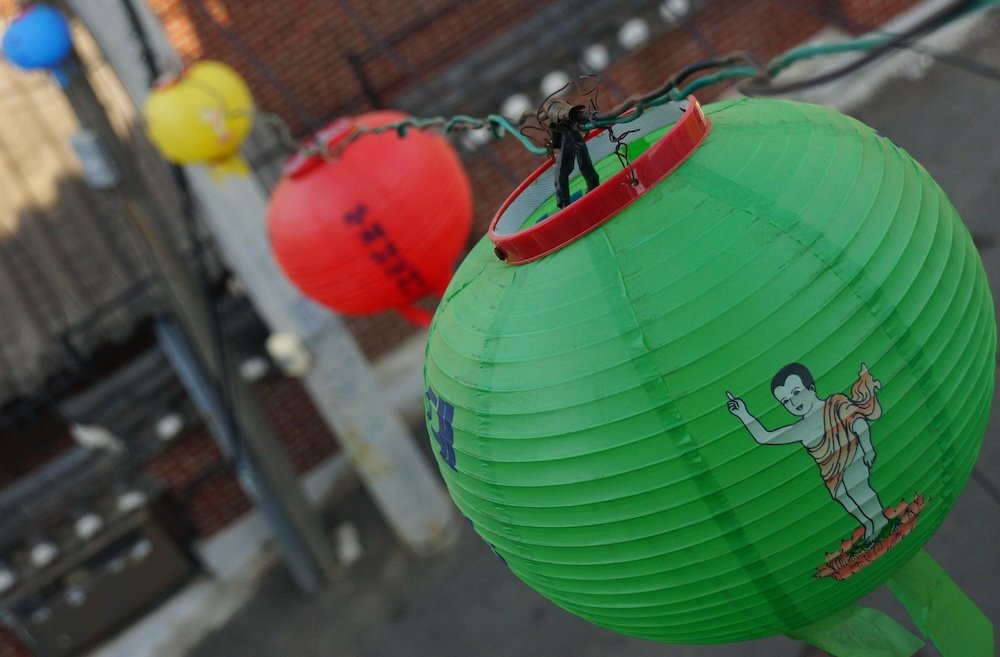
More Attractions
Back in 2002, Korea co-hosted the World Cup with Japan. While that tournament is well in the past, you can take in K-League football at Suwon World Cup Stadium. The dedication of Korean sports fans is legendary – with a capacity of 42,000, the atmosphere in this place can get intense during games, so be sure to be a part of it if you can.
Take in a symbol of Chinese-Korean friendship by spending an hour or so in Wolhwawon Garden. In 2005, the Chinese province of Guangdong sent over 80 gardeners to create a green space that boasts water features, pavilions, and other aspects commonly associated with Chinese gardens.
A relaxing spot in the midst of a busy city, it is a great place to catch your breath if you are feeling stressed during your visit to Suwon.
source: Expoza Travel on YouTube
Top 33 Things To Do in Suwon, Korea For Visitors
Here are the top 33 things to do in Suwon:

1. Explore Hwaseong Fortress
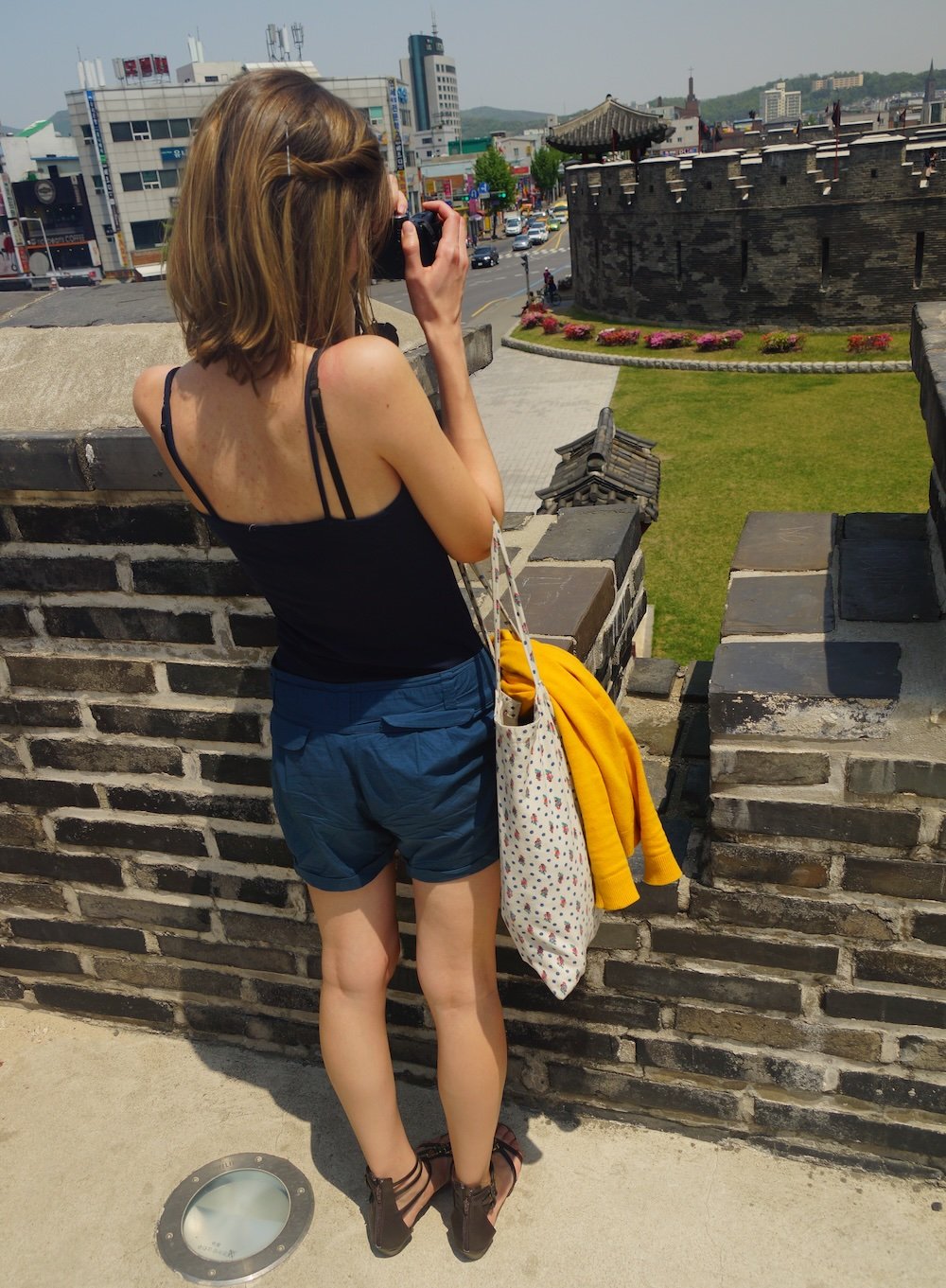
Step back in time at Hwaseong Fortress, a majestic structure from Korea’s Joseon Dynasty. Walk along the massive walls and soak in panoramic views of Suwon City below. The fortress is adorned with beautifully restored gates, watchtowers, and pavilions, each telling its own story. At night, Hwaseong Fortress transforms with stunning illuminations, offering a magical perspective of its historical grandeur.

- Historic architecture: Marvel at the intricate design and impressive stone walls of Hwaseong Fortress.
- Panoramic views: Enjoy sweeping vistas of Suwon City from various points along the walls.
- Night illuminations: Experience the fortress’s enchanting glow during evening tours.

2. Visit the Korean Folk Village
Immerse yourself in traditional Korean culture at the Korean Folk Village, where over 260 traditional houses showcase the lifestyle of the Joseon era. Watch captivating cultural performances, including folk music and traditional dances, that bring history to life. Explore various workshops and craft demonstrations to learn about ancient Korean arts and crafts. Seasonal festivals add an extra layer of excitement, offering unique insights into Korea’s rich heritage.

- Authentic exhibits: Discover over 260 traditional Korean houses and historical artifacts.
- Cultural performances: Enjoy live folk music, dance, and theatrical shows.
- Interactive workshops: Participate in hands-on activities to learn traditional Korean crafts.
3. Stroll through Suwoncheon Stream
Take a relaxing walk along Suwoncheon Stream, a serene waterway that winds through the heart of Suwon. The picturesque streamside path is perfect for jogging, cycling, or simply enjoying a peaceful stroll amidst nature. Admire the charming bridges and lush greenery that enhance the area’s natural beauty. In spring, the cherry blossoms lining the stream create a breathtakingly beautiful scene.
- Scenic pathways: Enjoy well-maintained trails ideal for walking, jogging, and cycling.
- Cherry blossoms: Witness stunning sakura blooms during the spring season.
- Peaceful atmosphere: Relax by the tranquil waters and lush surroundings.
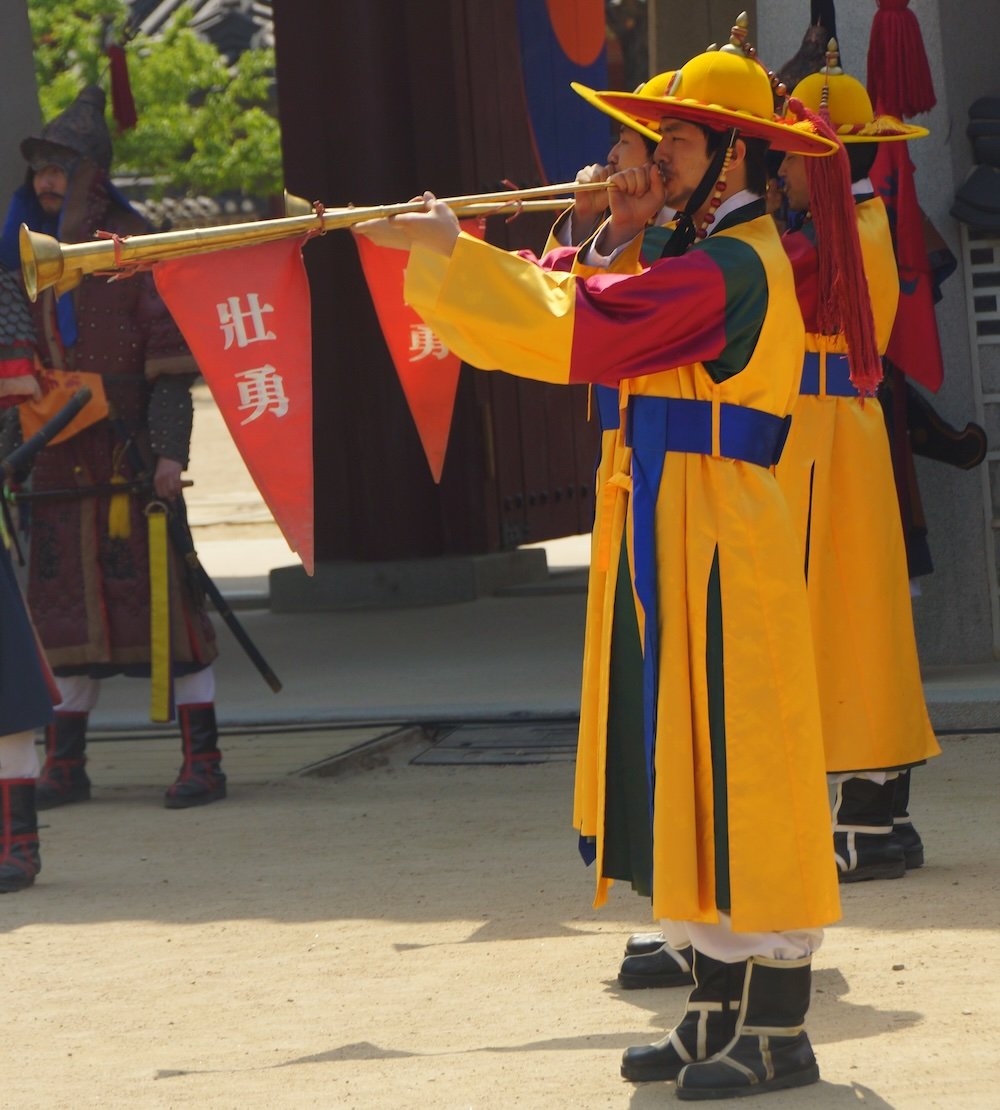
4. Experience Suwon Hwaseong Cultural Festival
Join the vibrant Suwon Hwaseong Cultural Festival, an annual celebration of the city’s history and culture. Watch colorful parades, traditional performances, and impressive military reenactments that bring the fortress’s history to life. Engage in various cultural experiences, from traditional crafts to delicious Korean street food. The highlight of the festival is the reenactment of King Jeongjo’s royal procession, offering a dynamic glimpse into Korea’s royal past.

- Colorful parades: Enjoy lively processions featuring traditional costumes and performances.
- Cultural activities: Participate in workshops, crafts, and interactive exhibits.
- Historical reenactments: Witness dramatic reenactments of royal processions and historical events.
5. Discover Suwon Hwaseong Museum
Delve deeper into the history of Hwaseong Fortress at the Suwon Hwaseong Museum. The museum offers detailed exhibits on the construction, architecture, and significance of the fortress. Learn about the life of King Jeongjo and his contributions to Suwon’s development through engaging displays and multimedia presentations. Interactive exhibits make the museum a fascinating visit for history buffs and curious travelers alike.
- Comprehensive exhibits: Explore detailed displays on Hwaseong Fortress’s construction and history.
- Multimedia presentations: Enjoy engaging videos and interactive exhibits.
- Educational insights: Gain a deeper understanding of King Jeongjo’s legacy and Suwon’s development.
6. Enjoy Shopping and Dining in Ingye-dong
Experience the bustling energy of Ingye-dong, Suwon’s premier shopping and dining district. The area is filled with a variety of shops, from trendy boutiques to traditional Korean stores, offering everything from fashion to unique souvenirs. Indulge in delicious Korean cuisine at the numerous restaurants and cafes, serving both traditional dishes and international flavors. In the evenings, Ingye-dong comes alive with vibrant nightlife, including karaoke bars and lively clubs.
- Diverse shopping: Browse through a mix of modern boutiques and traditional Korean stores.
- Gourmet dining: Savor a wide range of Korean and international cuisines at local restaurants.
- Lively nightlife: Enjoy the vibrant evening scene with bars, clubs, and live music venues.
7. Visit the Suwon City Hall Observation Deck
Get a bird’s-eye view of Suwon from the Suwon City Hall Observation Deck. Located atop the city hall building, the deck offers panoramic views of Hwaseong Fortress, Gwanggyo Lake Park, and the sprawling cityscape. It’s a perfect spot for photography enthusiasts looking to capture stunning city views. Best of all, the observation deck is free to access, making it an accessible attraction for all visitors.
- Panoramic views: Capture stunning vistas of Suwon’s key landmarks and cityscape.
- Photography hotspot: Perfect for taking memorable photos from above.
- Free access: Enjoy incredible views without any admission fee.
8. Explore Gwanggyo Lake Park
Relax and unwind at Gwanggyo Lake Park, an eco-friendly urban space surrounding a beautiful man-made lake. The park features walking and jogging paths, lush greenery, and serene water views, making it an ideal spot for outdoor activities. Enjoy boating on the lake or have a picnic in the designated areas. The park also hosts various cultural events and art installations, adding an artistic touch to the natural setting.
- Scenic lake: Enjoy tranquil boat rides and picturesque water views.
- Recreational activities: Perfect for walking, jogging, cycling, and picnicking.
- Cultural events: Attend art installations, performances, and community gatherings.
9. Watch a Match at Suwon World Cup Stadium
Feel the excitement of live sports at the Suwon World Cup Stadium, also known as Big Bird. This iconic venue hosted matches during the 2002 FIFA World Cup and is now home to the Suwon Samsung Bluewings football team. Experience the passion of Korean football fans as you cheer on the home team in a thrilling match. The stadium also offers tours, allowing visitors to explore its impressive facilities and learn about its history.
- Live football matches: Cheer on the Suwon Samsung Bluewings in an electric atmosphere.
- Stadium tours: Explore the impressive facilities and learn about the stadium’s history.
- Iconic architecture: Admire the unique design of the stadium, resembling a bird in flight.
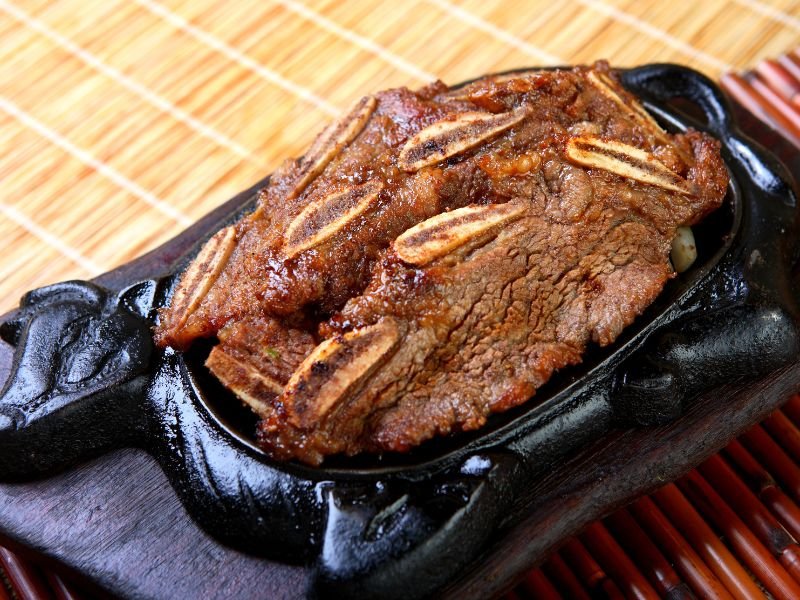
10. Try Suwon Galbi
No trip to Suwon is complete without savoring the famous Suwon Galbi (Korean short ribs). This local delicacy is known for its tender, marinated meat grilled to perfection, offering a rich and savory flavor. Numerous restaurants across the city specialize in galbi, each offering their unique take on this beloved dish. Whether you dine in a traditional barbecue restaurant or a modern eatery, trying Suwon Galbi is a must for any food lover.
- Tender marinated meat: Enjoy succulent short ribs cooked to perfection.
- Variety of restaurants: Choose from traditional barbecue spots to contemporary dining venues.
- Local specialty: Experience an authentic taste of Suwon’s culinary heritage.
11. Visit the Toilet Museum (Haewoojae)
Experience a quirky and informative visit to the Toilet Museum (Haewoojae), a unique attraction dedicated to the history and culture of toilets. The museum showcases a variety of toilets from different eras and cultures, highlighting the importance of sanitation and hygiene. The building itself is architecturally fascinating, shaped like a giant toilet bowl, making it a fun photo opportunity. It’s an unconventional museum that offers both education and entertainment for visitors of all ages.
- Unique exhibits: Explore toilets from various periods and cultures, showcasing sanitation evolution.
- Architectural curiosity: Photograph the museum’s distinctive toilet-shaped design.
- Educational fun: Learn about the importance of hygiene and the history of toilets in an entertaining way.
12. Tour the Samsung Innovation Museum
Delve into the world of technology at the Samsung Innovation Museum in Suwon. This museum highlights Samsung’s contributions to the electronics industry, showcasing everything from early radios and televisions to the latest smartphones and virtual reality devices. Interactive displays and multimedia presentations provide a comprehensive look at the evolution of technology. It’s a must-visit for tech enthusiasts and anyone interested in the future of innovation.
- Technological exhibits: Discover the evolution of electronics and Samsung’s role in it.
- Interactive displays: Engage with hands-on exhibits and multimedia presentations.
- Future insights: Learn about upcoming technologies and innovation trends.
13. Enjoy the Suwoncheon and Hyowon’s Bell
Visit the Suwoncheon Stream area to see Hyowon’s Bell, a large bell installed to commemorate King Jeongjo’s filial piety and the construction of Hwaseong Fortress. Ringing the bell is believed to bring good luck and is a popular activity for visitors. The surrounding area is beautifully landscaped, perfect for a leisurely walk alongside the stream. The peaceful sound of the bell and the scenic views make it a memorable spot for relaxation and reflection.
- Commemorative bell: Ring Hyowon’s Bell for good luck and a memorable experience.
- Beautiful landscaping: Enjoy well-maintained gardens and scenic stream views.
- Peaceful ambiance: Relax in a tranquil setting perfect for reflection and leisure.
14. Explore Ajou University Campus
Take a stroll through the Ajou University Campus, known for its modern architecture and expansive green spaces. The campus offers a serene environment, perfect for walking, studying, or simply enjoying the peaceful surroundings. Visit the university’s art galleries, museums, and cultural centers that host various exhibitions and events. The vibrant student life and academic atmosphere make Ajou University a fascinating place to explore.
- Modern architecture: Admire the sleek and contemporary design of the campus buildings.
- Cultural attractions: Explore art galleries, museums, and cultural centers on campus.
- Peaceful environment: Enjoy the tranquil green spaces and serene walking paths.
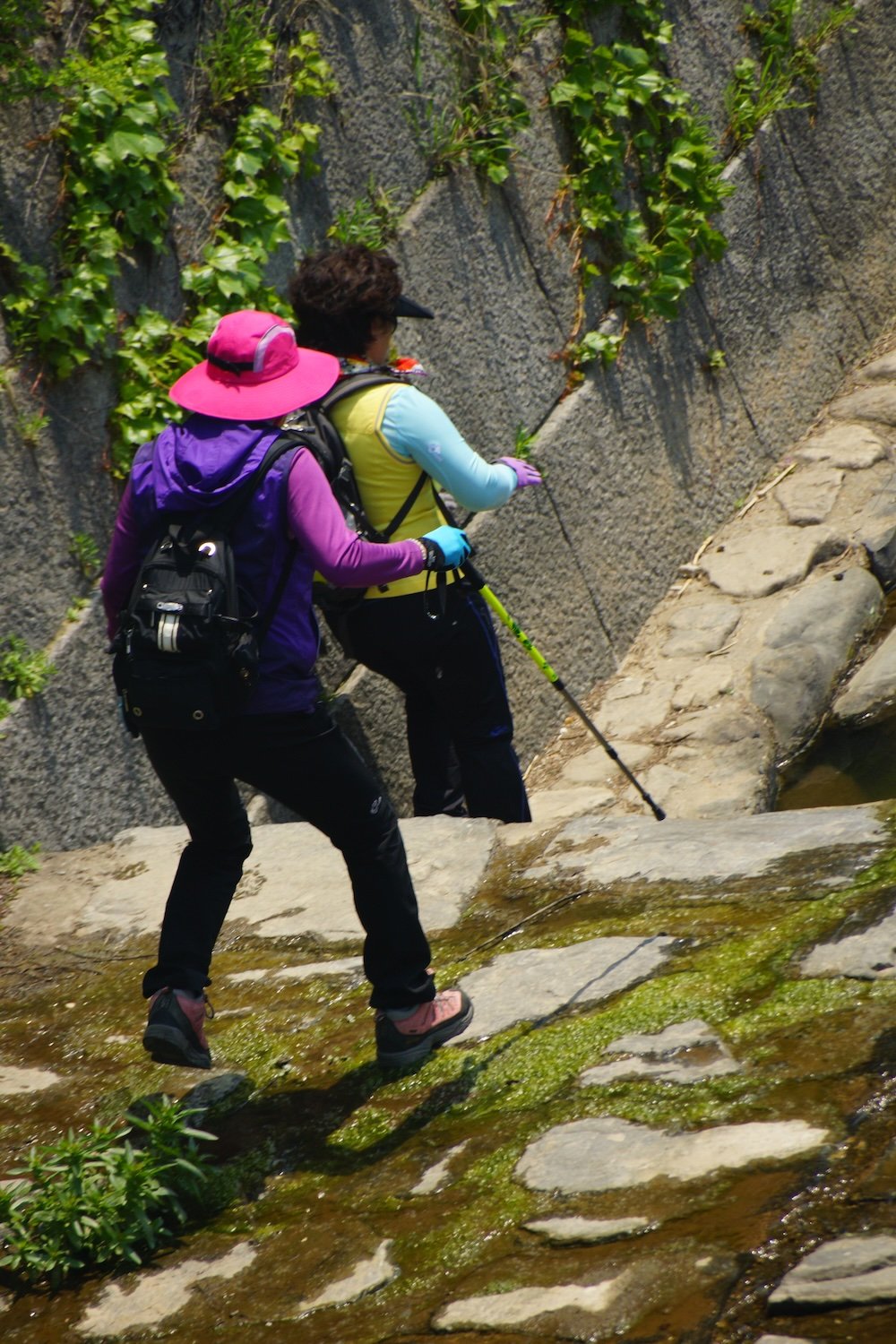
15. Hike at Gwanggyosan Mountain
Embark on an invigorating hike up Gwanggyosan Mountain, offering trails of varying difficulty levels and breathtaking views of Suwon and the surrounding areas. The mountain is covered in lush forests and dotted with temples and rest areas, providing a peaceful retreat into nature. Whether you’re an experienced hiker or a casual walker, Gwanggyosan Mountain offers something for everyone. In autumn, the vibrant foliage adds a stunning backdrop to your hike, making it an unforgettable experience.
- Diverse trails: Choose from easy walks to challenging hikes with rewarding views.
- Natural beauty: Immerse yourself in lush forests and scenic landscapes.
- Seasonal colors: Enjoy the vibrant autumn foliage that enhances the mountain’s beauty.
16. Discover Mr. Toilet House
Visit the Mr. Toilet House, the former home of Sim Jae-duck, the founder of the World Toilet Association. Now serving as a museum, it highlights global sanitation issues and the importance of clean water and hygiene. The house itself is uniquely shaped like a toilet, making it an intriguing architectural landmark. It’s an educational and entertaining stop that aims to break taboos and promote cleanliness worldwide.
- Unique architecture: Explore a house designed in the shape of a toilet.
- Educational exhibits: Learn about global sanitation and hygiene initiatives.
- Cultural significance: Understand the importance of cleanliness through interactive displays.
17. Visit Nam June Paik Art Center
Celebrate the legacy of Nam June Paik, a pioneer of video art, at the Nam June Paik Art Center. The center showcases a diverse collection of his works, including video installations, sculptures, and interactive pieces that blend technology and art. Enjoy temporary exhibitions featuring contemporary artists inspired by Paik’s innovative spirit. The center offers a unique artistic experience, making it a must-visit for art lovers and creative minds.
- Diverse art collection: Explore Nam June Paik’s groundbreaking video art and sculptures.
- Interactive installations: Engage with artworks that blend technology and creativity.
- Temporary exhibitions: Enjoy rotating displays that feature contemporary and inspired artists.
18. Stroll through Manseok Park
Relax and unwind at Manseok Park, a large recreational area in Suwon featuring jogging paths, sports facilities, and a picturesque lake. The park is perfect for outdoor activities like jogging, playing sports, or having a picnic with family and friends. Enjoy the beautifully maintained gardens and serene water features that provide a tranquil escape from the city’s hustle and bustle. Throughout the year, Manseok Park hosts various cultural events and festivals, adding vibrancy to its peaceful surroundings.
- Recreational activities: Jog, play sports, or enjoy a leisurely picnic in the park.
- Scenic beauty: Admire the lush gardens and serene lake views.
- Cultural events: Participate in festivals and events held throughout the year.
19. Attend the Suwon Jazz Festival
Immerse yourself in the smooth sounds of jazz at the Suwon Jazz Festival, an annual event that brings together local and international jazz artists. Held in various venues across the city, the festival offers a series of concerts and performances that cater to all jazz enthusiasts. Enjoy live music under the stars, dance to rhythmic tunes, and soak in the vibrant cultural atmosphere. The festival is a highlight for music lovers, providing a platform for talented musicians to showcase their skills.
- Live performances: Enjoy jazz concerts featuring both local and international artists.
- Vibrant atmosphere: Experience the lively and engaging cultural scene of Suwon.
- Variety of venues: Attend performances in multiple locations, each offering a unique setting.
20. Learn at Suwon Science College Observatory
Explore the wonders of the universe at the Suwon Science College Observatory, where visitors can engage in public viewing sessions with powerful telescopes. Learn about stars, planets, and celestial phenomena through guided tours and educational programs led by knowledgeable astronomers. The observatory also hosts lectures and workshops that delve into various aspects of astronomy and space science. It’s a fascinating destination for families, students, and anyone curious about the cosmos.
- Public viewing sessions: Observe stars, planets, and other celestial bodies through advanced telescopes.
- Educational programs: Attend lectures and workshops on astronomy and space science.
- Interactive learning: Engage with astronomers and gain insights into the universe.
21. Visit the Suwon Museum of Art
Discover contemporary and traditional art at the Suwon Museum of Art, featuring a diverse collection of Korean and international artworks. The museum’s modern architecture provides a stunning backdrop for exhibitions, which include paintings, sculptures, and multimedia installations. Participate in art workshops and educational programs that foster creativity and appreciation for the arts. The museum also hosts temporary exhibitions, ensuring there’s always something new and exciting to explore.
- Diverse art collection: Explore a wide range of artworks from Korean and international artists.
- Modern architecture: Enjoy the museum’s sleek and inviting design.
- Interactive workshops: Participate in art classes and creative workshops offered by the museum.

22. Experience the Yongjusa Temple
Find peace and spirituality at Yongjusa Temple, a historic Buddhist temple known for its beautiful architecture and serene surroundings. The temple is an important site honoring the memory of King Jeongjo’s father and plays a significant role in Korea’s religious history. Wander through the temple grounds, admire ancient trees, and visit the majestic pagodas and statues. It’s a perfect place for meditation, reflection, and experiencing traditional Korean Buddhism.
- Historic significance: Explore the temple’s rich history and its connection to King Jeongjo.
- Beautiful architecture: Admire traditional Korean temple designs and intricate details.
- Peaceful environment: Enjoy a serene atmosphere ideal for meditation and relaxation.
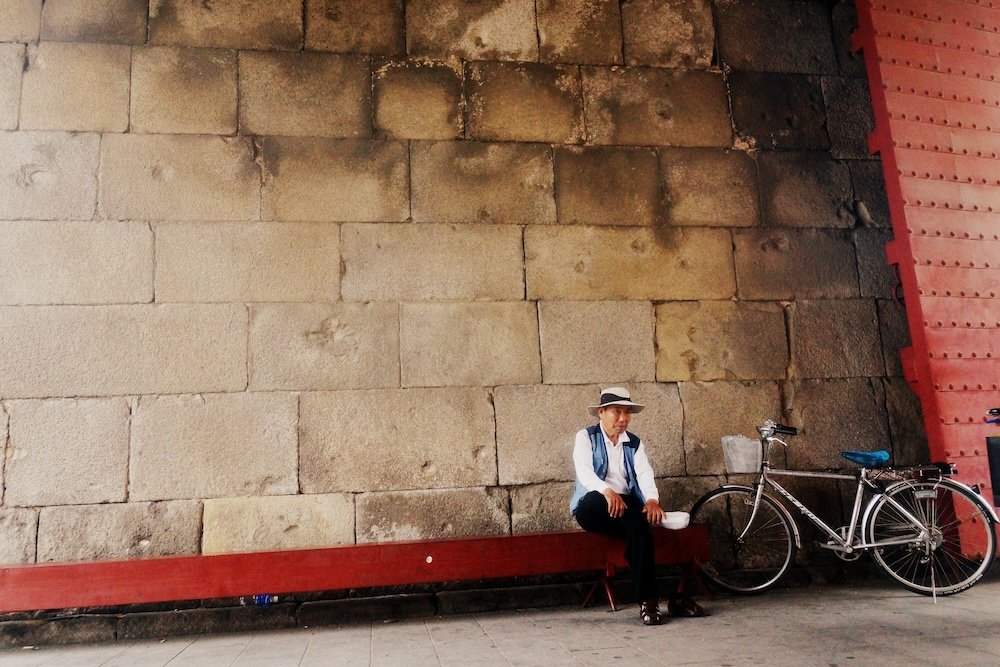
23. Cycle Around Suwon
Explore Suwon’s scenic routes on two wheels by cycling around the city. Suwon offers well-maintained bike paths that take you past major attractions, parks, and along the Suwoncheon Stream. Rent a bicycle from one of the many rental shops and enjoy a healthy and eco-friendly way to see the city. Cycling allows you to cover more ground and discover hidden gems that you might miss on foot.
- Well-maintained bike paths: Enjoy safe and scenic routes throughout Suwon.
- Convenient rentals: Easily rent bicycles from numerous rental shops around the city.
- Explore at your own pace: Discover hidden attractions and enjoy the fresh air while cycling.
24. Enjoy Traditional Korean Tea at a Local Tea House
Experience the art of Korean tea at one of Suwon’s traditional tea houses. These cozy establishments offer a tranquil setting to savor a variety of Korean teas, such as green tea, omija cha (five-flavor berry tea), and ssanghwa cha (herbal tea). Pair your tea with traditional Korean sweets like yakgwa and hangwa for a complete cultural experience. The tea houses often feature traditional decor, creating an authentic ambiance that enhances your visit.
- Variety of teas: Taste a range of traditional Korean teas with unique flavors.
- Traditional sweets: Enjoy delicious Korean desserts that complement your tea.
- Authentic ambiance: Relax in beautifully decorated tea houses that reflect Korean heritage.
25. Explore the Suwon City Wall
While Hwaseong Fortress is the centerpiece, the Suwon City Wall offers additional paths and historical insights into the city’s past. These lesser-known sections provide a quieter and more intimate experience, with hiking trails that meander through scenic landscapes. Along the way, discover historical markers and informational signs that explain the significance of various parts of the wall. It’s a great way to delve deeper into Suwon’s history while enjoying the outdoors.
- Historic pathways: Walk along sections of the ancient city wall with rich historical context.
- Scenic hikes: Enjoy beautiful views and nature while exploring the wall’s trails.
- Educational signs: Learn about the wall’s history and its role in Suwon’s defense.
26. Visit Paldalmun Market
Dive into the local culture at Paldalmun Market, one of Suwon’s oldest traditional markets. This bustling marketplace offers a variety of goods, from fresh produce and seafood to clothing and household items. Sample delicious street food like tteokbokki (spicy rice cakes) and hotteok (sweet pancakes) as you explore the vibrant stalls. Paldalmun Market is a great place to experience the everyday life of Suwon residents and pick up unique souvenirs.
- Diverse offerings: Shop for fresh produce, seafood, clothing, and more in a lively market setting.
- Street food: Taste a variety of traditional Korean snacks and dishes available at food stalls.
- Authentic experience: Immerse yourself in the local atmosphere and interact with friendly vendors.

27. Attend the Suwon Hwaseong Cultural Festival
Celebrate Suwon’s rich heritage at the Suwon Hwaseong Cultural Festival, an annual event that highlights the city’s history and culture through parades, performances, and reenactments. The festival brings Hwaseong Fortress to life with traditional music, dance, and martial arts displays that showcase the skills of Korea’s past. Enjoy local delicacies and participate in cultural workshops that teach traditional crafts and practices. It’s a vibrant celebration that connects visitors with Suwon’s storied past and lively present.
- Vibrant parades: Watch colorful processions featuring traditional costumes and performances.
- Cultural performances: Enjoy live music, dance, and martial arts demonstrations.
- Interactive workshops: Participate in hands-on activities that highlight traditional Korean crafts.
28. Take a Cooking Class on Korean Cuisine
Enhance your culinary skills by taking a Korean cooking class in Suwon. Learn to prepare iconic dishes like Suwon Galbi, kimchi, and bibimbap under the guidance of experienced local chefs. These classes often include a visit to a local market to select fresh ingredients, providing a comprehensive culinary experience. By the end of the class, you’ll have the skills to recreate delicious Korean meals at home and a deeper appreciation for Korean cuisine.
- Hands-on learning: Gain practical cooking skills by preparing traditional Korean dishes.
- Market tours: Explore local markets to select fresh and authentic ingredients.
- Delicious results: Enjoy the fruits of your labor by tasting the dishes you’ve prepared.
29. Explore the Gyeonggi Arts Center
Discover a diverse range of artistic expressions at the Gyeonggi Arts Center, Suwon’s premier venue for contemporary art and performances. The center hosts exhibitions, concerts, and theater productions that showcase both local and international talent. Attend workshops and interactive sessions to engage with the arts community and enhance your creative skills. The modern architecture and spacious galleries provide a welcoming environment for art lovers and curious visitors alike.
- Diverse performances: Enjoy concerts, theater productions, and art exhibitions all in one place.
- Interactive workshops: Participate in hands-on sessions to learn about various art forms.
- Contemporary art: Explore modern artworks that challenge and inspire creativity.
30. Visit the Samsung Innovation Museum
Located within the sprawling Samsung Digital City in Suwon, the Samsung Innovation Museum offers an in-depth look into the history and future of technology. Explore exhibits that highlight Samsung’s groundbreaking advancements in electronics, from early innovations to cutting-edge technologies like artificial intelligence and virtual reality. Interactive displays and multimedia presentations provide an engaging experience for visitors of all ages. The museum also features displays on sustainable technology and future trends, making it a fascinating visit for tech enthusiasts.
- Technological exhibits: Discover Samsung’s contributions to the electronics industry through detailed displays.
- Interactive presentations: Engage with multimedia exhibits that showcase the evolution of technology.
- Future insights: Learn about emerging technologies and Samsung’s vision for the future.
31. Relax at Woncheon Lake and Yuldong Park
Unwind at Woncheon Lake and Yuldong Park, a serene area perfect for relaxation and outdoor activities. The park features beautiful walking paths, a large lake for boating, and well-maintained sports facilities. Enjoy a leisurely picnic by the water or engage in recreational activities like kayaking and fishing. The park is also a popular spot for families, joggers, and anyone looking to enjoy nature within the city.
- Scenic lake: Enjoy boating, fishing, and picturesque views around Woncheon Lake.
- Recreational facilities: Utilize sports areas for activities like basketball and tennis.
- Family-friendly environment: Perfect for picnics, leisurely walks, and outdoor fun with loved ones.
32. Discover the Street Art of Suwon
Explore the vibrant street art scene in Suwon, where colorful murals and creative graffiti adorn the city’s alleyways and public spaces. These artistic expressions add a modern and dynamic flair to Suwon’s urban landscape, showcasing the talents of local and international artists. Take a self-guided tour to discover hidden gems and unique artworks that reflect the city’s cultural diversity. Street art in Suwon is not only visually stunning but also offers insightful commentary on social and cultural themes.
- Colorful murals: Admire the diverse and vibrant street art scattered throughout the city.
- Creative expression: Learn about the stories and messages behind each artwork.
- Urban exploration: Discover hidden alleys and public spaces transformed by art.
33. Participate in a Temple Stay at Hwaseong Haenggung Palace
Experience traditional Korean culture by participating in a temple stay program at Hwaseong Haenggung Palace, offering cultural immersion activities similar to those at Buddhist temples. Learn about Korean history, wear hanbok (traditional Korean attire), and engage in tea ceremonies and meditation sessions. The palace’s stunning architecture and historical significance provide a unique backdrop for your cultural experience. It’s an opportunity to connect with Korea’s royal heritage and gain a deeper understanding of its cultural practices.
- Cultural immersion: Engage in traditional Korean activities like tea ceremonies and hanbok wearing.
- Historical setting: Explore the beautiful Hwaseong Haenggung Palace and learn about its history.
- Authentic experience: Connect with Korean cultural practices in a serene and historic environment.
source: Learn Korean with GO! Billy Korean on YouTube
What To Eat and Drink at Restaurants in Suwon, South Korea
Here’s a brief travel guide to what you should eat and drink when visiting Suwon.
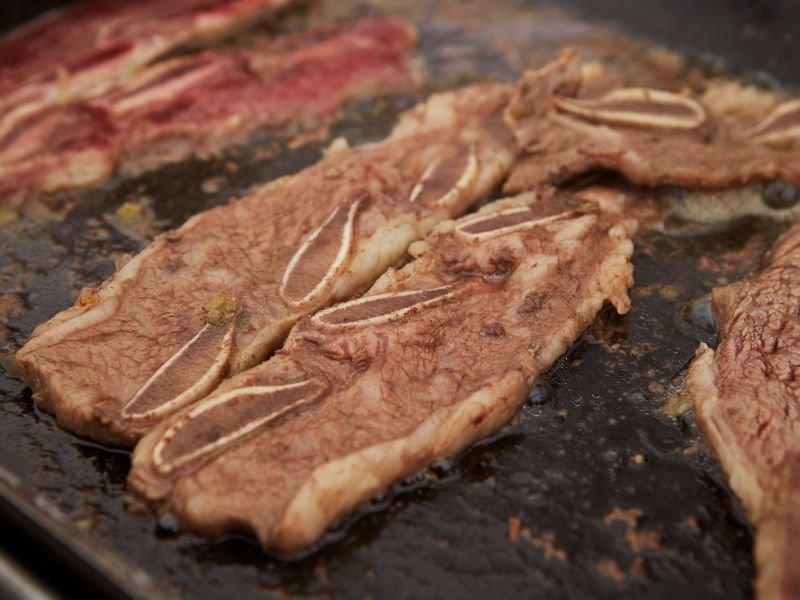
Suwon’s Signature Dish
1. Suwon Galbi
- Description: Suwon is synonymous with galbi, Korean grilled ribs. This dish is made from beef ribs marinated in a sweet and savory sauce before being grilled to perfection.
- How to Enjoy: Suwon galbi is best enjoyed at one of the many specialized galbi restaurants throughout the city, often grilled at your table.
- Where to Find: Visit the famous Yeongdong Market or Galbi Street where numerous restaurants offer their take on this local favorite.
- Tip: Pair your galbi with soju or local rice wine for a traditional Korean dining experience.
Traditional Korean Fare
2. Korean Fried Chicken
- Description: While not unique to Suwon, the city offers some of the crispiest and most flavorful Korean fried chicken you’ll find anywhere.
- How to Enjoy: Opt for the garlic or soy sauce variations for a local twist.
- Where to Find: Head to any of the local “chimaek” spots (chicken and beer restaurants) that dot the city.
- Tip: Enjoy your chicken with a cold Korean beer for the ultimate “chimaek” experience.
3. Tteokgalbi
- Description: Another grilled delicacy, tteokgalbi is made from minced beef or pork rib meat, seasoned and shaped into patties.
- How to Enjoy: It’s typically grilled and served with lettuce wraps and a spicy paste.
- Where to Find: Many traditional Korean restaurants in Suwon offer tteokgalbi, often as part of a larger meal set.
- Tip: Tteokgalbi pairs wonderfully with traditional side dishes like kimchi and pickled radishes.
4. Bibimbap
- Description: This popular Korean dish consists of a bowl of warm white rice topped with namul (sauteed and seasoned vegetables), chili pepper paste, soy sauce, a raw or fried egg, and sliced meat.
- How to Enjoy: Mix all the ingredients thoroughly before eating to enjoy the full range of flavors.
- Where to Find: Available in most traditional restaurants, each offering their unique spin on the dish.
- Tip: Bibimbap is both delicious and visually appealing, perfect for a healthy lunch.
Street Food and Snacks
5. Hotteok
- Description: A sweet Korean pancake filled with a mixture of cinnamon, honey, chopped peanuts, and brown sugar.
- How to Enjoy: Best eaten hot from street vendors during the colder months, making it a perfect winter snack.
- Where to Find: Look for street vendors in busy areas like markets and near the fortress.
- Tip: Watch out for the hot filling!
6. Mandu (Korean Dumplings)
- Description: These dumplings are stuffed with a variety of ingredients, including meat, vegetables, and noodles.
- How to Enjoy: Try them steamed, boiled, or fried, served with soy sauce for dipping.
- Where to Find: Available at street stalls and in restaurants throughout Suwon.
- Tip: Visit during the Mandu Festival in Suwon to try different regional varieties.
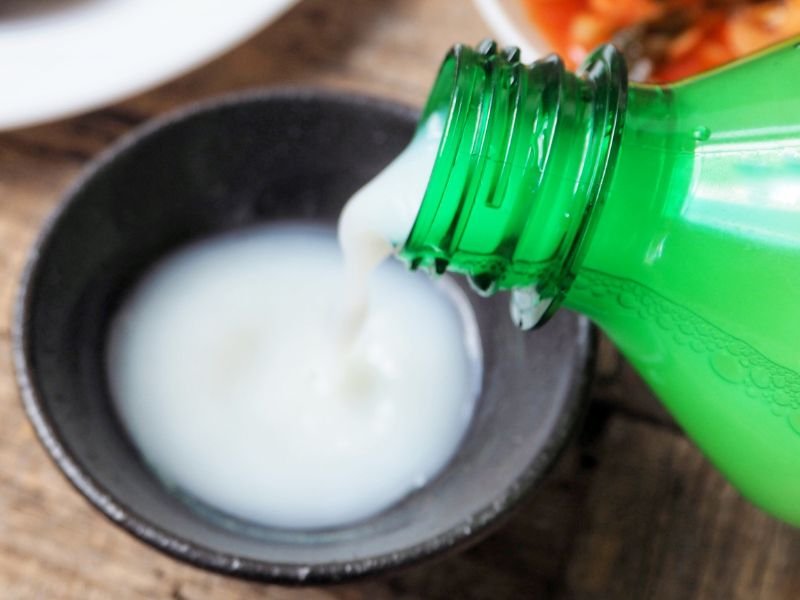
Beverages to Try
7. Makgeolli
- Description: A traditional Korean rice wine, slightly sweet and milky in appearance.
- How to Enjoy: Often served in a bowl, makgeolli is a popular accompaniment to Korean meals, especially spicy foods.
- Where to Find: Traditional Korean drinking houses (joomak) and restaurants will typically serve makgeolli.
- Tip: It’s customarily shaken or stirred before drinking to mix the sediment with the wine.
8. Sujeonggwa
- Description: A traditional cold dessert drink made from cinnamon, ginger, and persimmon.
- How to Enjoy: Served chilled, it’s often consumed after meals as a digestive aid.
- Where to Find: Many traditional Korean restaurants serve sujeonggwa, especially during festive meals.
- Tip: It’s particularly refreshing during the hot summer months.
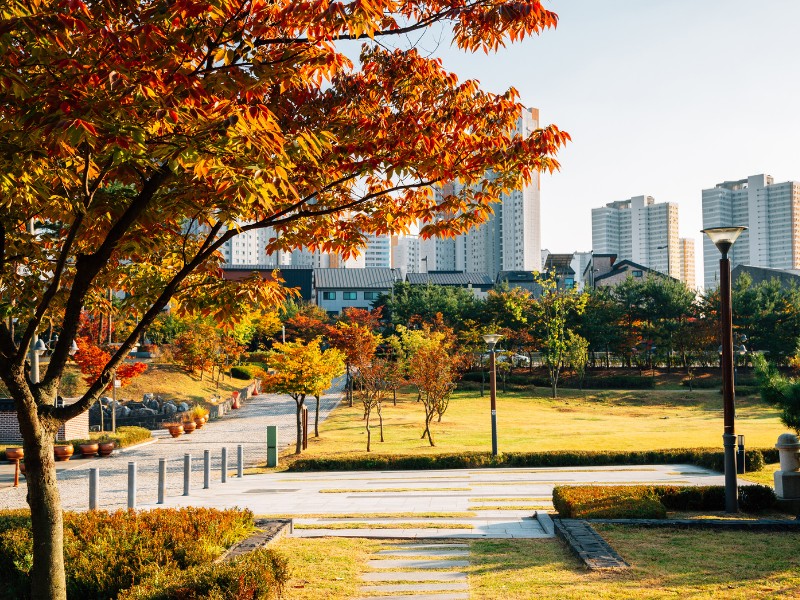
Tours For Visitors To Suwon, South Korea
Tours in Suwon cater to a variety of interests, ensuring that every visitor can find something to enhance their experience in Suwon.

1. Hwaseong Fortress Tour
- Overview: Explore the iconic UNESCO World Heritage site with a knowledgeable guide who brings its history to life.
- Highlights: Walk along the fortress walls, visit the Hwaseong Haenggung Palace, and see traditional Korean archery demonstrations.
- Duration: 2-3 hours.
- Why Go: This tour provides historical insights and spectacular views of the city and is a must-do for first-time visitors.
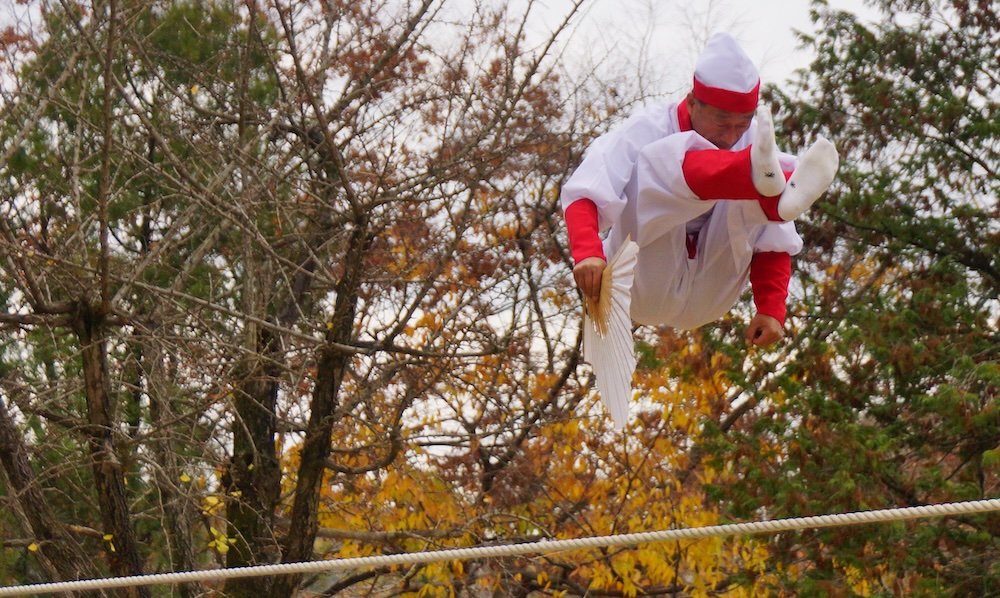
2. Korean Folk Village Tour
- Overview: Travel back in time at the Korean Folk Village, where you can see restored houses and artifacts from the Joseon Dynasty.
- Highlights: Watch live cultural performances, participate in traditional games, and explore authentic Joseon-era buildings.
- Duration: Half-day.
- Why Go: Ideal for families and history buffs, this tour offers a hands-on experience of traditional Korean culture and everyday life.
3. Suwon City Highlights Tour
- Overview: A comprehensive tour covering key attractions in Suwon, including the Hwaseong Fortress, Gyeonggi Arts Center, and local markets.
- Highlights: Sample local street food, shop for crafts, and enjoy modern art exhibitions.
- Duration: Full day.
- Why Go: Perfect for those who want to experience both the historical and modern aspects of Suwon in one day.
4. Suwon Galbi Food Tour
- Overview: Delve into the culinary scene of Suwon with a guided food tour focused on the city’s famous dish, Suwon galbi (Korean BBQ ribs).
- Highlights: Visit top-rated galbi restaurants, learn about the marinating process, and enjoy tastings paired with traditional sides.
- Duration: 3-4 hours.
- Why Go: A fantastic opportunity for food lovers to explore Suwon’s best dining spots and learn about its culinary heritage.
5. Suwon Cultural Heritage Night Tour
- Overview: Experience the enchanting atmosphere of Suwon’s historic sites lit up at night.
- Highlights: See the Hwaseong Fortress under the stars, visit the illuminated palace, and enjoy traditional tea in a historic setting.
- Duration: 2-3 hours.
- Why Go: This tour offers a unique perspective of Suwon’s historical sites, providing a different ambiance compared to daytime visits.
6. Suwon Craft Beer Tour
- Overview: Discover Suwon’s burgeoning craft beer scene with visits to local breweries and pubs.
- Highlights: Sample a variety of brews, learn about the brewing process, and meet local brewers.
- Duration: 3-4 hours.
- Why Go: Beer enthusiasts will enjoy tasting unique local brews and learning about the craft beer movement in South Korea.
7. Everland Resort Day Trip
- Overview: Enjoy a fun-filled day at Everland Resort, South Korea’s largest theme park, located just outside Suwon.
- Highlights: Ride thrilling roller coasters, visit the zoo, and see spectacular parades and shows.
- Duration: Full day.
- Why Go: Great for families and thrill-seekers looking for a day of entertainment and adventure outside the city.
8. Ecological Tour of Gwanggyo Lake Park
- Overview: Explore the eco-friendly design and natural beauty of Gwanggyo Lake Park on a guided tour.
- Highlights: Learn about sustainable urban planning, enjoy the peaceful lake scenery, and spot local wildlife.
- Duration: 2-3 hours.
- Why Go: Ideal for nature lovers and those interested in environmental conservation.
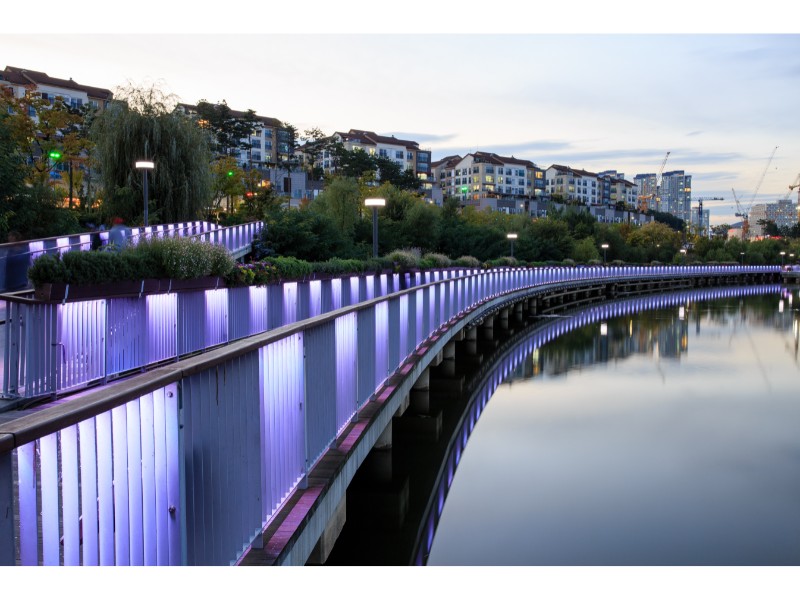
Day Trips From Suwon, South Korea
Here’s a mini travel guide to the top ten day trips you can take from Suwon, offering rich cultural experiences and beautiful natural landscapes.
1. Seoul
- Description: Just a short train ride away, Seoul is a vibrant metropolis combining modern skyscrapers, pop culture, and deep historical roots.
- Activities: Explore the historic Gyeongbokgung Palace, shop in the trendy districts of Myeongdong and Insadong, and unwind in the serene Bukchon Hanok Village.
- Best Time to Visit: Any time of year offers something unique, from spring cherry blossoms to festive winter lights.
- Tips: Use the subway for an easy and quick way to navigate between Seoul’s diverse neighborhoods and attractions.
2. The DMZ (Demilitarized Zone)
- Description: The DMZ is one of the most heavily fortified borders in the world, offering a poignant look at the divide between North and South Korea.
- Activities: Join a guided tour to visit the Third Infiltration Tunnel, Dorasan Observatory, and the Freedom Bridge.
- Best Time to Visit: Year-round, though clear days are best for views across the border at the observatory.
- Tips: Most tours require your passport and advance booking to ensure all security measures are met.
3. Incheon
- Description: Known for its coastal beauty and historical international port, Incheon blends cultural heritage with modern attractions.
- Activities: Visit Chinatown for a taste of cultural fusion, enjoy fresh seafood at Wolmido Island, and explore the modern Songdo International Business District.
- Best Time to Visit: Summer and early fall are great for enjoying the waterfront and outdoor activities.
- Tips: Don’t miss the Incheon Grand Park, especially lovely during the cherry blossom season.
4. Gyeongju
- Description: Often referred to as the “museum without walls,” Gyeongju is packed with ancient sites from the Silla kingdom.
- Activities: Explore Bulguksa Temple, wander through the Tumuli Park Belt with its royal tombs, and visit the Gyeongju National Museum.
- Best Time to Visit: Spring and autumn offer mild weather, perfect for exploring the extensive outdoor sites.
- Tips: Stay into the evening to see Anapji Pond illuminated at night, a truly magical experience.
5. Ganghwa Island
- Description: This historical island offers a quiet retreat with rich history, located at the mouth of the Han River.
- Activities: Tour the Ganghwa Peace Observatory, explore ancient dolmens, and visit the Ganghwa History Museum.
- Best Time to Visit: Spring or autumn for pleasant weather ideal for hiking and sightseeing.
- Tips: Try the local specialty, Ganghwa ginseng, known for its unique healing properties.
6. Chuncheon
- Description: A scenic city known for its lakes and mountains, Chuncheon offers a blend of natural beauty and relaxed city life.
- Activities: Take a leisurely boat ride on Soyang Lake, walk the romantic Chuncheon Myeongdong Street, and try the famous dakgalbi (spicy grilled chicken).
- Best Time to Visit: Autumn for the best lake views and vibrant foliage.
- Tips: Make sure to visit Nami Island, particularly famous for its picturesque tree-lined roads.
7. Everland and Caribbean Bay
- Description: South Korea’s largest theme park and its adjoining water park offer thrilling rides, extensive gardens, and diverse entertainment options.
- Activities: Enjoy the rides and attractions at Everland, cool off at Caribbean Bay, and explore the beautifully landscaped gardens.
- Best Time to Visit: Summer for the water park and late spring or early fall for Everland to avoid the heat.
- Tips: Purchase tickets online in advance to avoid long lines, especially during peak seasons.
8. Jeonju
- Description: This traditional city is famous for its well-preserved Hanok village, vibrant food scene, and cultural heritage.
- Activities: Wander through Jeonju Hanok Village, try the city’s famous bibimbap, and experience traditional Korean tea ceremonies.
- Best Time to Visit: Spring and fall, when traditional festivals often take place.
- Tips: Stay overnight in a Hanok to fully immerse yourself in the traditional Korean lifestyle.
9. Paju Book City
- Description: Paju Book City is a unique cultural complex dedicated to the literary arts, featuring hundreds of publishers in a creatively designed urban space.
- Activities: Browse through myriad bookstores, visit art galleries, and attend literary workshops or talks.
- Best Time to Visit: Year-round, as indoor activities are not weather-dependent.
- Tips: Check the schedule for special events like book fairs or author signings, which add to the experience.
10. Sorak Mountain National Park
- Description: This breathtaking national park offers some of South Korea’s most dramatic mountain landscapes and is perfect for nature lovers.
- Activities: Hike various trails to see ancient temples, pristine lakes, and stunning autumn leaves.
- Best Time to Visit: Late spring and early fall are ideal for hiking and enjoying the natural scenery.
- Tips: Wear comfortable hiking shoes and bring plenty of water, as some trails can be challenging.

Suwon Transportation Guide
Here’s our travel guide to getting around Suwon, including public transport, taxis, and more.
Public Transportation
1. Buses
- Overview: Suwon’s extensive bus network is a convenient way to explore the city and surrounding areas. The buses connect all major districts, tourist attractions, and residential areas.
- Routes: There are numerous bus lines, including local (town), intra-city, and express services to Seoul and other cities.
- Cost: Fares are economical, typically starting at 1,250 KRW for local buses, with slightly higher fares for express routes.
- Tips: Real-time bus information is available through various apps, making it easier to plan your journey without long waits.
2. Suwon Subway (Bundang Line)
- Overview: The Bundang Line is part of the greater Seoul Metropolitan Subway, providing efficient service between Suwon and Seoul.
- Stations of Interest: Suwon City Hall, Mangpo, Yeongtong, and Gwanggyo Jungang are key stations within Suwon, connecting residential and business areas directly to Seoul.
- Frequency: Trains run every 5 to 8 minutes during peak hours.
- Tips: The subway is ideal for avoiding traffic during rush hour and for quick trips to Seoul.
Taxis and Private Transport
3. Taxis
- Overview: Taxis in Suwon are plentiful and can be hailed on the street, booked via phone, or through various apps.
- Types: Regular taxis (gray or white) and deluxe taxis (black and known as ‘mobeom’ taxis) are available; deluxe taxis are more expensive but offer more comfort.
- Cost: Starting fare for regular taxis is around 3,800 KRW, with night surcharges applicable.
- Tips: Taxis are a great option late at night when public transport frequencies decrease.
4. Ride-Hailing Services
- Overview: International services like Uber are limited in South Korea, but local apps like Kakao T provide a similar experience.
- Advantages: Convenient for direct trips to your destination with easy payment through the app.
- Tips: These services are especially useful if you are not familiar with the local language, as routes and destinations can be set in the app.
Bicycles and Walking
5. Bicycle Sharing
- Overview: Suwon promotes eco-friendly transport options, including a city-wide bicycle-sharing program.
- Access: Bicycles can be rented from multiple stations around the city and are ideal for short trips or leisurely tours around tourist spots.
- Cost: Very affordable, with rates based on usage time.
- Tips: Explore historic areas like Hwaseong Fortress on bike for a unique and flexible sightseeing experience.
6. Walking
- Overview: Suwon is well-suited for pedestrians, particularly around major attractions like Hwaseong Fortress, which has a dedicated walking path along its perimeter.
- Advantages: Walking is the best way to experience local life, markets, and the historic zones.
- Tips: Comfortable walking shoes are recommended, especially if exploring the fortress and other historic sites.
Other Tips
- Travel Cards: Purchase a T-money or Cashbee card, which can be used on all public transport and even in convenience stores, for ease and additional savings.
- Accessibility: Most public transport and major stations are equipped with facilities for disabled travelers, including elevators and designated seating.
- Language Barrier: While major signs in transportation hubs will have English, downloading a translation app or carrying a phrasebook could be helpful for more complex interactions or directions.

Suwon 3-4 Days Travel Itinerary
If you have 3 to 4 days to explore Suwon, here’s a suggested travel itinerary to make the most of your time:
Day 1: Explore Historic Suwon
Morning: Hwaseong Fortress
- Start your journey at the UNESCO World Heritage-listed Hwaseong Fortress. Walk along the impressive walls of this 18th-century fortress, built by King Jeongjo, which offers panoramic views of the city and a deep dive into Korean history.
- Visit the Hwaseong Haenggung Palace within the fortress grounds, where the king sought refuge during times of war and unrest.
Afternoon: Korean Folk Village
- Travel just outside Suwon to the Korean Folk Village. Experience traditional Korean life through well-preserved houses, artifacts, and live performances such as folk dancing and jultagi (tightrope walking).
- Enjoy lunch at one of the village’s traditional restaurants, sampling classic dishes like bibimbap or jeonbok-juk (abalone porridge).
Evening: Dinner in Galbi Street
- Head back to Suwon and have dinner at Galbi Street, renowned for the famous Suwon galbi (marinated grilled ribs). This is a must-try culinary experience that Suwon is famous for.
- Take an evening stroll through the nearby markets to see the city come alive at night with its vibrant street food scene.
Day 2: Suwon’s Cultural and Modern Sights
Morning: Suwon Museum and National Geographic Information Institute
- Visit the Suwon Museum to learn more about the region’s history and cultural heritage.
- Stop by the National Geographic Information Institute, a unique establishment showcasing South Korea’s advancements in geographic information systems.
Afternoon: Gwanggyo Lake Park
- Relax at Gwanggyo Lake Park, a perfect spot for a leisurely walk or a picnic. Enjoy the urban oasis with its art center, water features, and lush greenery.
- Grab lunch at a café overlooking the lake, trying out some local snacks or a refreshing beverage.
Evening: Shopping and Entertainment
- Spend your evening at the Lotte Mall or the AK Plaza, where you can shop for everything from high-end brands to unique local crafts.
- Enjoy dinner at one of the mall’s restaurants, offering a range of international cuisine.
Day 3: Day Trip to Nearby Attractions
All Day: Visit Nearby Cities or Nature Spots
- Option 1: Day Trip to Seoul. Just a train ride away, spend the day exploring South Korea’s capital, visiting places like Gyeongbokgung Palace, Bukchon Hanok Village, and Myeongdong for shopping and street food.
- Option 2: Explore the Yeongneung/Nyeongneung Royal Tombs in the nearby Yeoju area, which are part of the UNESCO World Heritage Site honoring the Joseon dynasty’s royal family members.
- Option 3: Hike at Bukhansan National Park, offering scenic views and well-marked trails suitable for various skill levels.
Day 4: Leisure and Departure
Morning: Art and Architecture
- Visit the Suwon Art Center for contemporary art exhibitions and performances, exploring both Korean and international works.
- Check out Suwon’s City Hall area, known for its architectural beauty and public art installations.
Afternoon: Last-Minute Shopping and Relaxation
- Take some time for last-minute shopping in downtown Suwon, picking up souvenirs such as traditional Korean crafts or modern Korean pop culture memorabilia.
- Relax in one of Suwon’s traditional tea houses, enjoying a cup of Korean tea and some local pastries before your departure.
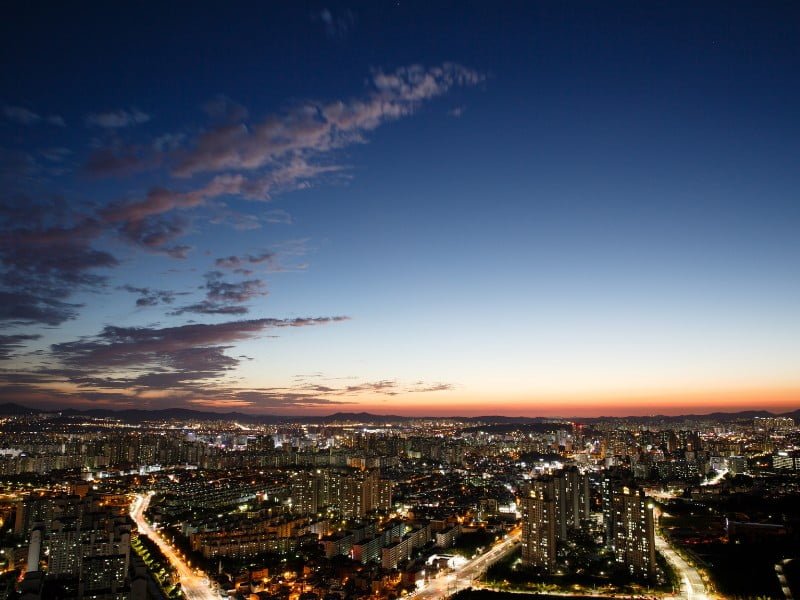
Where To Visit After Your Trip To Suwon?
Here’s a list of top places to visit after Suwon, each providing unique attractions and activities.
1. Seoul
- Description: Just north of Suwon, Seoul is a dynamic capital city that blends ancient history with cutting-edge modernity.
- Activities: Explore the royal palaces like Gyeongbokgung, shop in trendy districts like Gangnam and Hongdae, and experience the vibrant nightlife.
- Best Time to Visit: Spring and fall offer the most pleasant weather for exploring the city.
- Tips: Make sure to visit Namsan Tower for panoramic views of the sprawling cityscape.
2. Incheon
- Description: Known for its international airport, Incheon also boasts interesting cultural sites and a beautiful coastline.
- Activities: Visit Chinatown for some of the best Chinese food in Korea, explore the modern Songdo district, and relax at Eurwangni Beach.
- Best Time to Visit: Summer is great for beaches, while autumn provides pleasant weather for sightseeing.
- Tips: Don’t miss the Incheon Grand Park, especially during cherry blossom season for a picturesque experience.
3. Gangwon Province
- Description: East of Suwon, this province is known for its stunning natural landscapes and outdoor activities.
- Activities: Ski at resorts like Alpensia in Pyeongchang, hike in Seoraksan National Park, and relax at the beaches of Gangneung.
- Best Time to Visit: Winter for skiing and snowboarding, summer for beaches and hiking.
- Tips: Visit during the Taebaek Mountain Snow Festival for unique snow and ice sculptures.
4. Gyeongju
- Description: This ancient city was once the capital of the Silla Kingdom and is often called “the museum without walls.”
- Activities: Tour Bulguksa Temple and Seokguram Grotto, explore the Tumuli Park tombs, and visit the Gyeongju National Museum.
- Best Time to Visit: Spring and fall offer beautiful weather and the chance to see Gyeongju’s cherry blossoms and autumn leaves.
- Tips: Stay overnight to experience the city’s historical sites beautifully lit at night.
5. Jeonju
- Description: Known for its well-preserved Hanok Village, Jeonju is a cultural hub that offers a deep dive into traditional Korean life.
- Activities: Try making bibimbap, one of Korea’s signature dishes, visit the Jeonju Hanji Museum to learn about traditional paper making, and enjoy the vibrant atmosphere of Jeonju Hanok Village.
- Best Time to Visit: Spring or fall to avoid the extreme temperatures of summer and winter.
- Tips: Don’t leave without trying Jeonju’s famous choco pies from one of the local bakeries.
6. Busan
- Description: Located on the southeastern coast, Busan offers a mix of mountains, a vibrant waterfront, and bustling markets.
- Activities: Relax on Haeundae Beach, hike in Geumjeongsan, explore the seafood markets, and visit the Beomeosa Temple.
- Best Time to Visit: Late spring to early fall when the weather is warm and perfect for beach outings.
- Tips: Make a point to walk through Gamcheon Culture Village to see the brightly painted houses and art installations.
7. Daegu
- Description: A major city in the southeastern part of the country, Daegu is known for its hot summers, medicinal herb market, and modern shopping centers.
- Activities: Visit the Daegu Art Museum, relax in one of the many traditional Korean spas, and explore the old medicinal market to learn about Korea’s herbal remedies.
- Best Time to Visit: Spring and fall to enjoy moderate temperatures and colorful foliage.
- Tips: Try the local specialty, chicken ginseng soup, to get a taste of Daegu’s culinary offerings.
8. Jeju Island
- Description: A volcanic island off the southern coast of Korea, Jeju is famed for its scenic beauty, relaxed atmosphere, and unique cultural heritage.
- Activities: Walk around the iconic Hallasan Mountain, visit the lava tubes at Manjanggul Cave, and explore the island’s beautiful waterfalls and beaches.
- Best Time to Visit: Spring for the flowers and fall for the harvest festivals.
- Tips: Renting a car is the best way to explore the island at your own pace.
9. Jirisan National Park
- Description: One of the oldest and largest national parks in South Korea, Jirisan spans across three provinces and offers a range of hiking trails.
- Activities: Hike to the peak of Jirisan, explore the valleys, and visit the ancient Hwaeomsa Temple.
- Best Time to Visit: Late spring and early fall for the best hiking conditions.
- Tips: Prepare well for the hikes as some trails can be quite challenging.
10. Daejeon
- Description: Known as a science and technology hub, Daejeon offers a mix of educational sites and natural hot springs.
- Activities: Visit the National Science Museum, unwind in Yuseong Hot Springs, and explore the local markets.
- Best Time to Visit: Year-round, as its indoor attractions provide options regardless of the weather.
- Tips: Daejeon is less touristy, offering a more laid-back experience compared to Korea’s larger cities.
source: Travel video from our channel Samuel and Audrey on YouTube
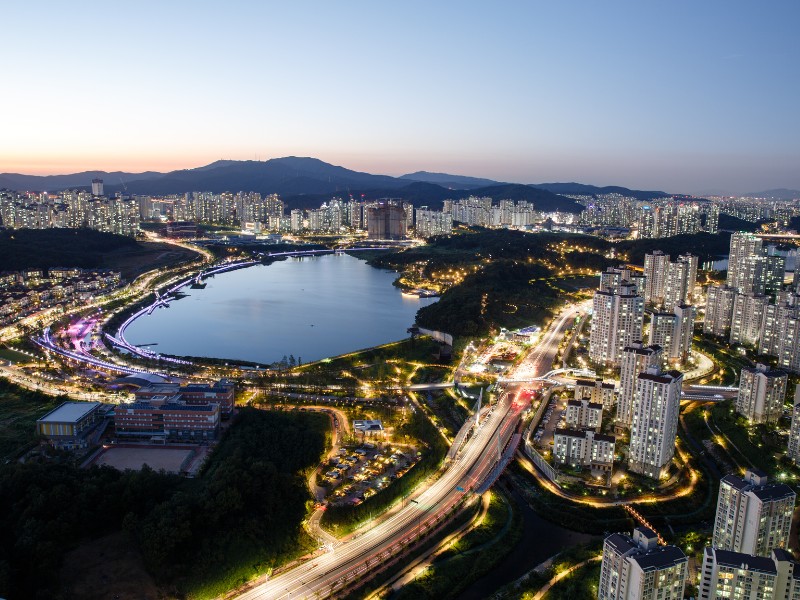
Suwon Travel Guide: Final Thoughts
As our exploration of Suwon comes to a close, it’s clear that this vibrant city offers more than just a quick stopover from Seoul. From the impressive ramparts of Hwaseong Fortress to the bustling markets brimming with delicious eats, Suwon invites travelers to dive deep into its rich tapestry of history and modern culture. Here’s a recap of why this city deserves a spot on your South Korean itinerary, along with some final tips to ensure you make the most of your visit.
Embrace the History
Step Back in Time
Hwaseong Fortress, a UNESCO World Heritage site, isn’t just a relic of the past; it’s a living monument where history breathes. Walking along its sturdy walls offers not only panoramic views of Suwon but also a palpable sense of Korea’s storied past. Whether you’re catching a traditional archery demonstration or exploring the secret gates and artillery towers, the fortress serves as the beating heart of Suwon. Each stone and structure tells a story, making your visit both educational and awe-inspiring.
- Living history: Experience the fortress as an active cultural site with regular demonstrations.
- Panoramic views: Capture stunning vistas of Suwon and its surrounding landscapes.
- Architectural marvel: Admire the intricate design and strategic layout of the fortress walls and gates.
Culinary Delights
Feast Your Senses
Suwon’s reputation as the capital of Korean BBQ, particularly the famed Suwon Galbi, is well earned. Dining here is a visceral experience, with sizzling meats and vibrant side dishes offering a feast for the senses. The city’s food markets, like the bustling Yeongdong Market, provide a playground for foodies looking to sample everything from spicy tteokbokki to sweet hotteok. Each bite is a taste of Suwon’s rich culinary heritage, blending traditional flavors with modern twists.
- Signature dishes: Indulge in Suwon’s renowned galbi and other mouthwatering BBQ options.
- Vibrant markets: Explore Yeongdong Market for an authentic taste of local street food.
- Culinary variety: Enjoy a wide range of flavors, from spicy snacks to sweet treats.
Modern Charms
A Blend of Old and New
Beyond its historical clout, Suwon is a dynamic hub of culture and technology. The city’s art scene, showcased in galleries and modern installations around Gwanggyo Lake Park, reflects its contemporary spirit. Meanwhile, tech enthusiasts will appreciate Suwon’s role as a high-tech industrial powerhouse, underscored by its innovative city planning and cutting-edge architecture. This seamless blend of tradition and modernity makes Suwon a city that honors its past while embracing the future.
- Contemporary art: Discover modern galleries and public art installations that add a creative flair to the city.
- High-tech hub: Explore Suwon’s advanced industrial areas and innovative architectural designs.
- Cultural fusion: Enjoy a harmonious mix of traditional heritage and modern cultural expressions.
Travel Tips
Getting Around Made Easy
Navigating Suwon is a breeze, thanks to its comprehensive public transportation system. Whether you’re hopping on a bus to the Korean Folk Village or taking a quick subway ride back to Seoul, getting where you need to go is simple and efficient. Don’t forget to pick up a T-money card for convenient access to buses, subways, and even taxis. This rechargeable card makes traveling around Suwon seamless, allowing you to focus more on exploring and less on logistics.
- Efficient transport: Utilize buses and subways to easily reach major attractions.
- T-money card: Conveniently pay for public transportation and taxis with a single card.
- Accessible routes: Enjoy well-connected routes that make traveling around Suwon straightforward.
Plan for the Seasons
Suwon is delightful year-round, but each season offers unique charms. Spring brings cherry blossoms at Gwanggyo Lake Park, creating picturesque landscapes perfect for leisurely strolls. Summer lights up the night with vibrant festivals and outdoor events, adding a festive energy to the city. Fall offers cool comfort, ideal for fortress walks and enjoying the changing foliage, while winter turns the city into a twinkling holiday wonderland with festive lights and seasonal markets. Choose your travel dates based on what you want to see and experience to make the most of your visit.
- Spring: Enjoy cherry blossoms and vibrant floral displays throughout the city.
- Summer: Participate in lively festivals and enjoy outdoor activities under the warm sun.
- Autumn and Winter: Experience comfortable weather for exploring and festive holiday celebrations.
So, farewell, Suwon, until next time—keep revealing your stories to those who seek them. Whether you’re captivated by its historical landmarks, tantalized by its culinary offerings, or inspired by its modern innovations, Suwon promises a memorable and enriching experience for every traveler.

Ode To Suwon
In Suwon town, where history meets the present day, The sights and sounds invite you to come and stay. From the Hwaseong Fortress with walls so high, To the bustling markets, where vendors cry.
The food, the drink, the culture, all so fine, In Suwon town, there’s always something to find. Try the spicy chicken or the sweet bean paste, A taste of Korea that you won’t want to waste.
And when the night falls, the city comes alive, With lights and music, it’s a sight to thrive. Explore the nightlife or take a peaceful stroll, In Suwon town, the adventures never grow old.
But if you seek more, there’s plenty to see, From Seoul to Jeju, a world of discovery. The beauty of Korea, beyond just this town, A land of wonder, waiting to be found.
So come to Suwon, with an open heart, And let the spirit of travel take part. For in this town, you’ll find memories to last, A journey of a lifetime, one to hold fast.
